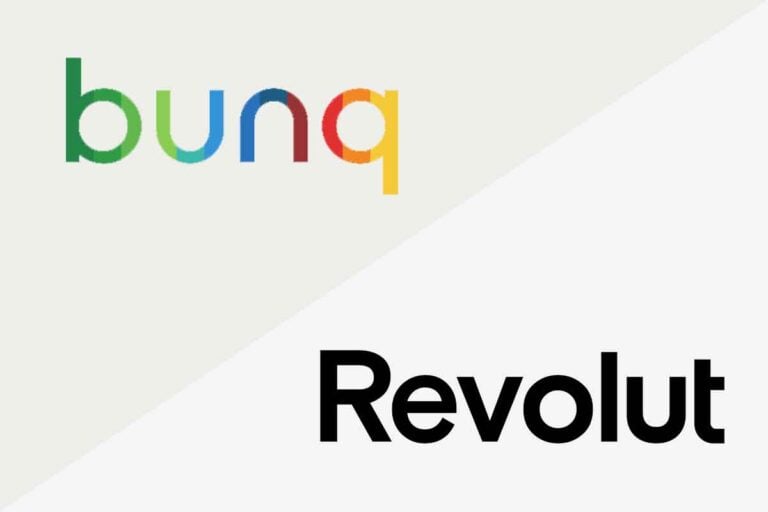In the evolving digital landscape of modern banking, two platforms, Bunq vs Revolut, have emerged as strong contenders, offering an impressive array of services tailored to business needs. As both offer a unique set of features, a comparison may aid businesses in deciding the right platform.
This article provides a detailed comparison between Bunq and Revolut, focusing on their pros, cons, fee structures, and unique features, to help businesses make an informed decision.
Bunq vs Revolut
| Feature | Bunq | Revolut |
|---|---|---|
| UK IBAN | Available for all accounts | Available for all accounts |
| European IBAN | Available for all accounts | Available for all accounts |
| API Access | Available with comprehensive documentation | Available with comprehensive documentation |
| Multi-currency accounts | Available, supports 39 currencies | Available, supports 150 currencies |
| Virtual cards | Available, free issuance | Available, free issuance |
| Physical cards | Available, £9 per card | Available, £4.99 per card |
| Instant payments | Available, instant SEPA transfers | Available, instant SEPA transfers |
| FX rates | Real-time, interbank rates | Real-time, interbank rates |
| Invoicing features | Available, integrated into app | Available, integrated into app |
| Spending analytics | Available, categorises spending | Available, categorises spending |
| Expense management | Available, receipt and expense tracking | Available, receipt and expense tracking |
| Batch payments | Available, simplifies mass payments | Available, simplifies mass payments |
| Sub-accounts | Available, for better money management | Available, for better money management |
| Mobile and desktop apps | Available, fully functional | Available, fully functional |
| 24/7 customer service | Available, through chat support | Available, through chat support |
| Free ATM withdrawals | Limited, £0.99 per withdrawal | Limited, free up to £300/month, 2% fee thereafter |
| Payment links | Available, enables easy payments | Not available |
| Interest on balance | Available, on all account types | Not available |
| Cashback rewards | Not available | Available, on card purchases |
| Business loans | Not available | Available, flexible terms |
 | Tide Business Bank Accounts ✓ Free, Plus, or Pro Account ✓ iOS & Android Mobile App ✓ Upload & Auto-Match Receipts Pricing Trial period Contact | |
 | Card One Money ✓ No Credit Checks ✓ Simple Fees ✓ Up To 3.5% Cashback Pricing Trial period Contact | |
 | ANNA Money ✓ Apply In 10 Minutes ✓ Bookkeeping & Payroll Tools ✓ User-Friendly Mobile App Pricing Trial period Contact | |
 | HSBC Business Banking ✓ Business Current Account ✓ In-Branch, Online & App Banking ✓ FSCS Protected Pricing Trial period Contact | |
 | Metro Business Banking ✓ Business Current Account ✓ High Street Presence ✓ FSCS Protected Pricing Trial period Contact | |
 | Mettle Business Banking ✓ Business Bank Account ✓ Online & App ✓ Quick & Easy Application Process Pricing Trial period Contact | |
 | Monzo Business Banking ✓ Business Current Account ✓ Dedicated mobile app experience ✓ FSCS Protected Pricing Trial period Contact | |
 | Virgin Money ✓ Business M Account ✓ In-Store, Online & App Banking ✓ Insights & Forecasting Platform Pricing Trial period Contact |
Bunq
Bunq, a Dutch-based challenger bank, extends its services across Europe, offering a seamless banking experience. Prioritising customer convenience, it offers services such as instant payments, flexible savings, and batch payments, among others.
Pros and Cons
Pros
- Bunq’s ‘Tree Planting’ initiative is an appealing feature for sustainability-conscious businesses.
- Businesses can earn interest on their balance, a rare feature amongst challenger banks.
- Instant payment feature ensures a quick transfer of funds.
- Batch payments can simplify payroll and vendor payments.
- A robust API allows businesses to integrate Bunq with their existing systems.
- Invoicing features integrated directly into the banking app can be convenient.
Cons
- No cashback rewards on purchases may disappoint businesses that make large transactions.
- The absence of business loans could limit growth opportunities for some businesses.
- Bunq does not support payment links, limiting flexibility in payments.
- Certain premium features come with a high price tag.
Table of fees and charges
| Service | Fee |
|---|---|
| Monthly Fee | £19.99 |
| Payments in Euros | Free |
| Payments in other currencies | Varies based on currency |
| Cash withdrawals | £0.99 per withdrawal |
| Physical card issuance | £9 |
| Virtual card issuance | Free |
Unique and standout features
Bunq allows businesses to earn interest on their balance, a unique feature among digital banks.
Its commitment to green causes is showcased through its tree-planting initiative; for every £100 spent, Bunq plants a tree, contributing to global sustainability efforts.
Batch payments, another standout feature, can simplify mass payments to employees or vendors.
Bunq also boasts a robust API, allowing businesses to easily integrate the banking service with their existing software systems.
Revolut
Revolut, a London-based financial technology company, offers a versatile banking platform that facilitates global transactions. Its feature-rich platform caters to a variety of business needs.
Pros and cons
Pros
- Revolut offers cashback rewards on card purchases, a beneficial feature for high-spending businesses.
- The availability of business loans provides businesses with the funds to grow.
- Multi-currency accounts make international business transactions easier.
- Seamless integration with popular business software such as QuickBooks and Xero.
- The ‘Expense Management’ feature simplifies tracking and approval of business expenses.
Cons
- No interest earned on account balance.
- Limited customer service compared to traditional banks.
- Additional fees may apply for premium services.
- Some users report occasional delays in transactions.
Table of fees and charges
| Service | Fee |
|---|---|
| Monthly Fee | £25 |
| Payments in Pounds | Free |
| Payments in other currencies | Varies based on currency |
| Cash withdrawals | Free up to £300/month, 2% fee thereafter |
| Physical card issuance | £4.99 |
| Virtual card issuance | Free |
Unique and standout features
Revolut’s ability to offer business loans is a distinct advantage over many fintech banks.
Its cashback rewards program can significantly benefit businesses with high card spending.
The ‘Expense Management’ feature simplifies the approval and reimbursement process, saving valuable time.
Also, integration with popular accounting software, such as QuickBooks and Xero, simplifies bookkeeping and financial management.
Conclusion – Bunq vs Revolut
Both Bunq and Revolut offer compelling features for businesses.
Bunq stands out with its environmental initiatives and the ability to earn interest, while Revolut shines with cashback rewards and business loans.
The decision between the two ultimately depends on the specific needs and values of your business.
It is recommended to thoroughly evaluate both platforms and consider a trial period to fully understand which bank can better serve your business requirements.
FAQ
Yes, both platforms allow businesses to switch, but it is important to evaluate any potential switching costs or time delays.
Both offer customer support, but the quality and response times may vary.
Yes, businesses can maintain accounts with both banks and use them as per their specific needs.
Bunq offers joint accounts, while Revolut currently does not.
Both Bunq and Revolut are regulated by financial authorities, the Dutch Central Bank and the UK Financial Conduct Authority respectively, providing a level of safety and assurance.
Yes, both Bunq and Revolut support multi-currency accounts, making international transactions convenient.

